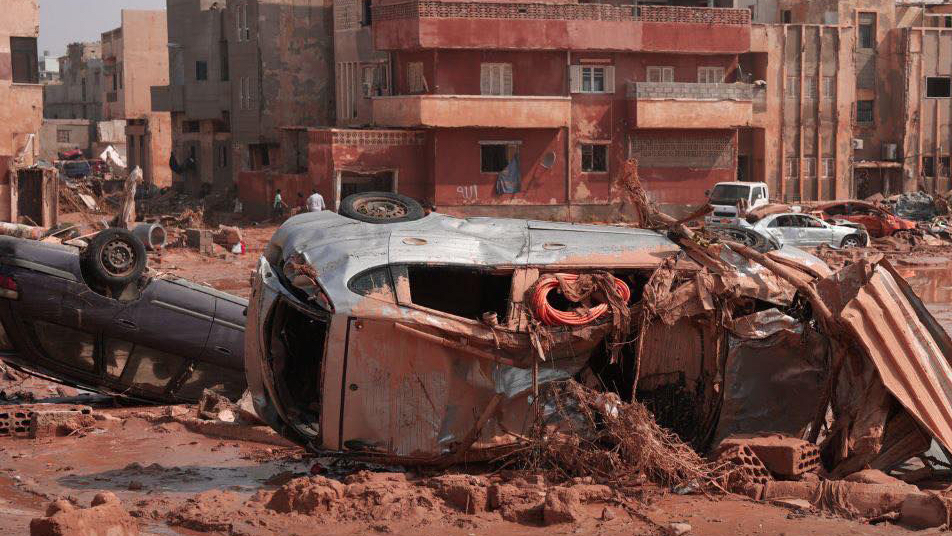Thousands feared dead in catastrophic Libya flooding
A powerful Mediterranean storm pummeled Libya's northeast coast, wiping out entire neighborhoods


A free daily email with the biggest news stories of the day – and the best features from TheWeek.com
You are now subscribed
Your newsletter sign-up was successful
Heavy rainfall from Mediterranean storm Daniel pounded northeastern Libya over the weekend, causing two dams to burst above the city of Derna. "The flowing water carried away entire neighborhoods, eventually depositing them into the sea," Ahmed al-Mosmari, a spokesman for the armed forces in eastern Libya, said Monday.

Al-Mosmari said more than 2,000 people were dead and thousands more missing in Derna, numbers echoed by Prime Minister Ossama Hamad of the eastern government but not independently verified. The Libyan Red Crescent put the number of confirmed deaths in Derna at more than 300 late Monday, though it said it expected the number to rise. "Derna is a tragedy, a catastrophe," said Asmahan Belaoun, a Libyan lawmaker with family in the city, according to The Washington Post.
The storm caused serious flooding in Greece and slammed Turkey and Bulgaria last week before moving over the warm waters of the Mediterranean and strengthening into a tropical-like cyclone known as a medicane. It then dumped heavy rain on the northeastern coast of Libya, hitting Derna, the cities of Bayda and Shahhat and several smaller towns and villages. The weakened storm is heading to Egypt next.
The Week
Escape your echo chamber. Get the facts behind the news, plus analysis from multiple perspectives.

Sign up for The Week's Free Newsletters
From our morning news briefing to a weekly Good News Newsletter, get the best of The Week delivered directly to your inbox.
From our morning news briefing to a weekly Good News Newsletter, get the best of The Week delivered directly to your inbox.
Libya's National Center on Meteorology said more than 16 inches of rain fell on Bayda over a 24-hour period. Bayda typically gets about half an inch of rain in September and 21.4 inches a year, the Post reported, citing the site Floodlist.
Libya has not had a central government since 2014, after the 2011 NATO-backed uprising that toppled Moammar Gadhafi left a vacuum filled by warring factions. The area hit by the catastrophic flooding is in the area controlled by the Libyan National Army. The internationally recognized Tripoli-based government that controls western Libya said Monday it sent ambulances, rescue convoys and doctors to eastern Libya to help with disaster relief. Both governments declared three days of mourning.
A free daily email with the biggest news stories of the day – and the best features from TheWeek.com
Peter has worked as a news and culture writer and editor at The Week since the site's launch in 2008. He covers politics, world affairs, religion and cultural currents. His journalism career began as a copy editor at a financial newswire and has included editorial positions at The New York Times Magazine, Facts on File, and Oregon State University.
-
 The world’s most romantic hotels
The world’s most romantic hotelsThe Week Recommends Treetop hideaways, secluded villas and a woodland cabin – perfect settings for Valentine’s Day
-
 Democrats push for ICE accountability
Democrats push for ICE accountabilityFeature U.S. citizens shot and violently detained by immigration agents testify at Capitol Hill hearing
-
 The price of sporting glory
The price of sporting gloryFeature The Milan-Cortina Winter Olympics kicked off this week. Will Italy regret playing host?
-
 Epstein files topple law CEO, roil UK government
Epstein files topple law CEO, roil UK governmentSpeed Read Peter Mandelson, Britain’s former ambassador to the US, is caught up in the scandal
-
 Iran and US prepare to meet after skirmishes
Iran and US prepare to meet after skirmishesSpeed Read The incident comes amid heightened tensions in the Middle East
-
 Israel retrieves final hostage’s body from Gaza
Israel retrieves final hostage’s body from GazaSpeed Read The 24-year-old police officer was killed during the initial Hamas attack
-
 China’s Xi targets top general in growing purge
China’s Xi targets top general in growing purgeSpeed Read Zhang Youxia is being investigated over ‘grave violations’ of the law
-
 Panama and Canada are negotiating over a crucial copper mine
Panama and Canada are negotiating over a crucial copper mineIn the Spotlight Panama is set to make a final decision on the mine this summer
-
 Why Greenland’s natural resources are nearly impossible to mine
Why Greenland’s natural resources are nearly impossible to mineThe Explainer The country’s natural landscape makes the task extremely difficult
-
 Iran cuts internet as protests escalate
Iran cuts internet as protests escalateSpeed Reada Government buildings across the country have been set on fire
-
 US nabs ‘shadow’ tanker claimed by Russia
US nabs ‘shadow’ tanker claimed by RussiaSpeed Read The ship was one of two vessels seized by the US military
